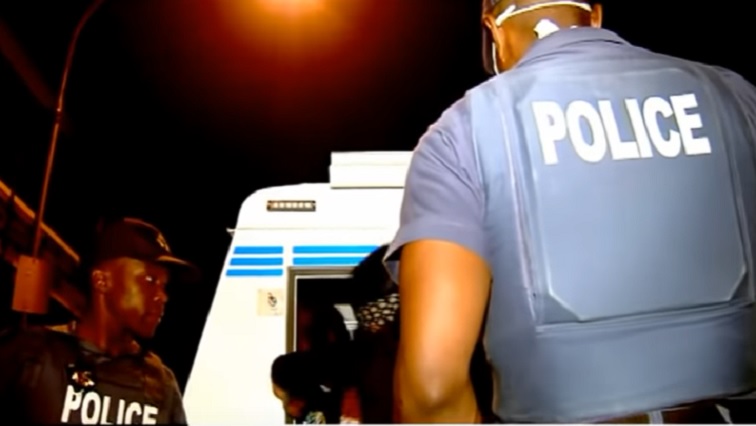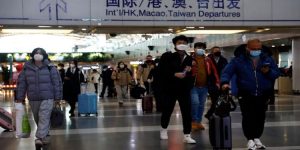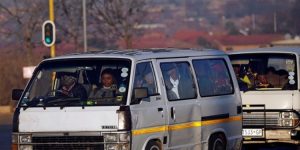The second week of the 21-day national lockdown saw street vendors rushing to get permits so they could go back in business. This is after lockdown regulations were relaxed, allowing them to trade.
The informal sector plays an integral role in the country’s economy.
Hawkers rely on selling their produce on the streets to earn a living.
With the lockdown in full swing, the number of people on the streets has mostly been reduced to essential workers making their way to work.
Now that regulations have been relaxed, allowing street vendors to ply their trade, they are faced with uncertainty over making any profit.
Nhlanhla Mbhele from Estcourt, in the KwaZulu-Natal Midlands, makes a living by selling fruit and vegetables on the streets of Durban .
“The situation was very bad when we were not making any income. Our families were suffering. So, after government allowed us to sell our goods we are hoping to recover, although it is very quiet at the moment. During the day, we do not have customers since taxis are not operating. Coming back on the afternoon, we rely on essential service workers to buy something on their way home. We are seriously struggling although we appreciate the relaxation of the regulation. We will get few rands taking them home some of the street vendors are not yet back. There are only a few of us. We are really hungry and need to earn a living.”
In Gauteng, the City of Johannesburg was forced to suspend the issuing of the permits to informal traders. This is after a large crowd descended on the offices on the Economic Development Department, compromising safety and social distancing.
“The process was to take place until Wednesday the 08th of April 2020. It is, however, unfortunate that the team from Economic Development at 66 Jorissen started experiencing major challenges today, where a large crowd descended to the venue compromising safety and social distancing. Informal traders from various areas in the City of Johannesburg and some from outside of the city’s jurisdiction queued and expected to get accreditation and permits to operate. This led to the city taking a decision to temporarily suspend the process of issuing the permits until further notice,” says Member of the Mayoral Committee for Economic Development, Lloyd Phillips.
In the video below, soldiers disperse informal traders who are seeking permits:
There is increasing concern that the number of coronavirus cases in the country will continue to rise as the government launches a mass testing drive.
South Africa has the highest number of confirmed COVID-19 cases in Africa, standing at 1 845 with 18 deaths as of Wednesday night.
Coronavirus hotspot in KwaZulu-Natal
One hotspot for the virus is the St. Augustine’s Hospital in Durban, where Health Minister Zweli Mkhize says around 48 staff have been infected.
KwaZulu-Natal Premier Sihle Zikalala says they are concerned about the infections at the private hospital.
“With regards to the developments at St. Augustine’s Hospital as announced by Health Minister Honourable Dr. Zweli Mkhize, 66 have tested positive for COVID-19 at St. Augustine Hospital in Durban of these 48 are staff members and the rest are patients. This is an extremely concerning development and we have asked for detail examination of how cases were being managed at the hospital. At this point in time, we are responding to the developing crisis and we are not as yet sitting in a judgment. We don’t want to conclude. We are looking and still observing what happened and we have said that let be further investigation on the matter.”
The lion’s share of coronavirus deaths have occurred in KwaZulu-Natal.
According to the Health Ministry, the latest COVID-19 victims come from the Free State, Gauteng and KwaZulu-Natal-Natal. The deceased are all male and ages ranged from 49 to 70 years old.
The total number of tests conducted stands at over 63 000, an increase of more than 5 600 from the last update. The number of people who have recovered from the viral infection is now at 95.
As at today the number of confirmed #COVID19 cases are 1845 pic.twitter.com/ZMenLDs8o2
— Zweli Mkhize (@DrZweliMkhize) April 8, 2020
Non-compliance of regulations
The week also saw a clampdown on people disregarding lockdown regulations, among them Communications Minister Stella Ndabeni-Abrahams, who has since been placed on special leave.
A storm brewed on social media after photograph surfaced of Ndabeni-Abrahams and African National Congress National Executive Committee (NEC) member, Mduduzi Manana, having lunch at Manana’s Johannesburg home during the lockdown.
In response, President Cyril Ramaphosa placed the Minister on special leave for two months, one of which is unpaid.
“The President believes that no one, including the Minister, is above the law and therefore, the law must take its course. The minister must face the same consequences as everyone else in the country for violating the rules that have been set for all of us. The President summoned the Minister on the Tuesday 7th of April where he reprimanded her and directed her to deliver a public apology to the nation,” said Presidency Spokesperson, Khusela Diko.
Authorities have reiterated their calls for people to adhere to the COVID-19 regulations during the lockdown.
Below are some of the amended regulations:

Loading…






